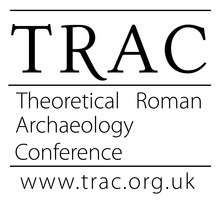Theoretical Roman Archaeology Conference
 Logo of TRAC | |
| Predecessor | Theoretical Archaeology Group |
|---|---|
| Formation | 23rd - 24th March 1991 |
| Founder | Eleanor Scott |
| Founded at | University of Newcastle |
| Purpose | Promotion of a theoretical discourse in Anglophone Roman archaeology |
| Website | http://trac.org.uk/ |
The Theoretical Roman Archaeology Conference (TRAC) is an academic organisation and conference which was designed to be an arena for open discussion of archaeological theory in Roman archaeology.
History
TRAC, organised initially by Eleanor Scott, was held for the first time in the Department of Archaeology at the University of Newcastle on 23-24 March 1991.[1][2]
Historically, one of TRAC's main focuses has been on the debates surrounding Romanisation, and this dominated many of the volumes during the 1990s. However, since the early 2000s, there have been a rising number of discussions relating to post-imperial and post-colonial approaches to the Roman world.[3]
TRAC was originally established as an one-off event, but, the interest that this conference garnered led to it becoming an annual fixture. After the initial meeting in Newcastle, TRAC has been run at many of the major archaeology departments in the UK and has even been organised at institutions in Europe and America.
TRAC was joined with RAC (the Roman Archaeology Conference), organised by the Roman Society, at Reading University in 1995.[4]
Participants
Many of the participants in TRAC are younger scholars or postgraduates who use the conference to outline their own original research and attempt to re-define existing models about the Roman past.[5]
Andrew Gardner, in an article in TRAC 2005, raised the issue of a gender imbalance in the history of TRAC conferences.[6] However, in more recent article, Eleanor Scott concluded that TRAC had given an equal platform to female archaeologists working within Roman archaeology.[7]
Journal
TRAC was previously published as a set of conference proceedings.[8] From TRAC 2017 it moved to an online open access journal, the Theoretical Roman Archaeology Journal, published by the Open Library of Humanities.[9]
Subjects
- Romanisation
- Post-colonial archaeology
- Gender and material cultural
- Material cultural theory
References
- ↑ Scott, Eleanor, ed. (1993). Theoretical Roman archaeology : first conference proceedings : [23 - 24 March 1991, Newcastle]. Aldershot: Avebury. pp. 1–2. ISBN 1856287033.
- ↑ "Bio and career". ELEANOR SCOTT ARCHAEOLOGY. Retrieved 24 February 2018.
- ↑ Millet, Martin (2016). "Roman Britain since Haverfield". In Millett, Martin; Revell, Louise; Moore, Alison. The Oxford Handbook of Roman Britain. Oxford University Press. pp. 22–42.
- ↑ "RAC Archive « Roman Archaeology Conference". romansocietyrac.ac.uk. p. 3. Retrieved 24 February 2018.
- ↑ Laurence, Ray (1999). "Theoretical Roman Archaeology". Britannia. 30: 387. doi:10.2307/526691. Retrieved 24 February 2018.
- ↑ Gardner, Andrew (2006). "The future of TRAC". In Croxford, Ben; Goodchild, Helen; Lucas, Jason; Rav, Nick. TRAC 2005 proceedings of the fifteenth annual theoretical roman archaeology conference which took place at the University of Birmingham, 31st March-3rd April 2005. Oxford: Oxbow books. pp. 128–137. ISBN 1842072196.
- ↑ Scott, Eleanor (2012). "Introduction: The Theoretical Roman Archaeology turns 21". In Duggan, Maria; McIntosh, Frances; Rohl, Darrell J. TRAC 2011 : proceedings of the Twenty-First Annual Theoretical Roman Archaeology Conference, which took place at the University of Newcastle, 14-17 April 2011. Oxford: Oxbow Books. pp. 1–3. ISBN 1842174991.
- ↑ "TRAC Proceedings". TRAC. TRAC. 11 March 2013.
- ↑ "Theoretical Roman Archaeology Journal". TRAC. TRAC. 10 May 2017.